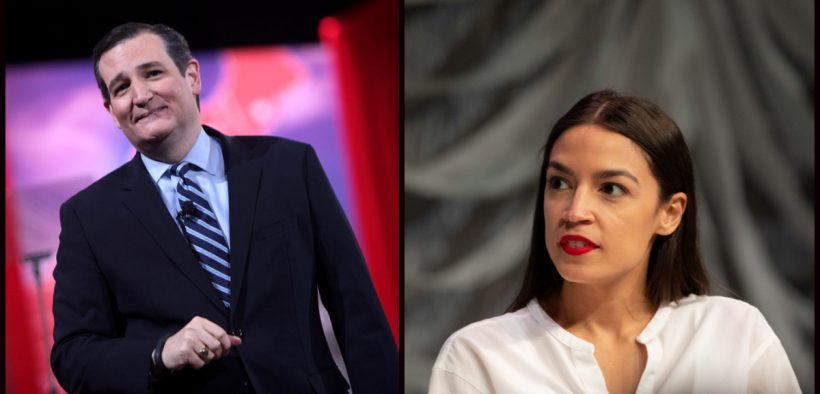AOC and Ted Cruz Form Unlikely Pairing in Rare Bipartisan Initiative

“Here’s something I don’t say often: on this point, I AGREE with @AOC. Indeed, I have long called for a LIFETIME BAN on former Members of Congress becoming lobbyists.”
In a surprise twitter exchange last Thursday, progressive congresswoman Alexandria Ocasio-Cortez (D-NY) appeared to find common ground with conservative senator Ted Cruz (R-TX).
After Public Citizen, a nonprofit consumer advocacy organization, released a report that showed nearly 60 percent of lawmakers who left office in 2018 went on to work as lobbyists, Ocasio-Cortez tweeted her disapproval.
“If you are a member of Congress + leave, you shouldn’t be allowed to turn right around & leverage your service for a lobbyist check. I don’t think it should be legal at all to become a corporate lobbyist if you’ve served in Congress. At minimum there should be a long wait period,” said the congresswoman.
Sen. Cruz then tweeted an affirmative response to AOC:
“Here’s something I don’t say often: on this point, I AGREE with @AOC. Indeed, I have long called for a LIFETIME BAN on former Members of Congress becoming lobbyists. The Swamp would hate it, but perhaps a chance for some bipartisan cooperation?”
Cruz’s former chief of staff, Rep. Chip Roy (R-TX), joined in and offered to co-sponsor the lobbying ban, as well as progressive Sen. Brian Schatz (D-HI).
“@TedCruz, if you’re serious about a clean bill, then I’m down. Let’s make a deal,” Ocasio-Cortez responded. “If we can agree on a bill with no partisan snuck-in clauses, no poison pills, etc – just a straight, clean ban on members of Congress becoming paid lobbyists – then I’ll co-lead the bill with you.”
“You’re on,” Cruz agreed.
In a time of intense political polarization, the twitter exchange appears to be a rare act of bipartisan good faith. But some experts believe an official lobbying ban would fail to change Washington’s revolving-door culture.
Will a Lobbying Ban Be Enough?
The investigative journalist Lee Fang responded AOC’s tweet, arguing the proposed ban would only drive fewer lobbyists to formally register while still peddling influence in less transparent ways.
“Most lobbyists are unregistered and the ban don’t have any impact on the industry or influence peddling. Very strong case that registered lobbying bans simply reduce transparency and little else,” Fang tweeted.
Fang used the prominent centrist Democrat Joe Crowley, who was defeated by Alexandria Ocasio-Cortez in November, as an example. Crowley evaded the year-long ban former lawmakers are supposed to honor after finishing their service by calling himself a “strategic consultant,” and now works for Squire Patton Boggs, DC’s largest lobbying firm.
“The only thing the ban accomplishes in Crowley’s case is that we don’t know his full client list,” Fang argued. The progressive journalist then proceeded to list actions he thought would be more effective in reducing corporate influence on public policy.
“Instead of a ban — Congress should expand enforcement powers to DOJ, the GAO and OCE to crack down on unregistered lobbying, tighten the definition of lobbyist per ABA suggestions, & have lobbyists wear name tags w/client list when they meet with lawmakers/staff,” tweeted Fang.
Dan Auble, a senior researcher with OpenSecrets, spoke to Vox about the importance of insider knowledge for lobbying firm’s success. Auble seconded Fang’s worries that a blanket ban would have exploitable loopholes that could allow unregistered “shadow lobbying” to thrive, and argued more extensive transparency measures would need to be included.
“The best way to close the revolving door is to expand existing lobby disclosure law (see above) & radically strengthen the institution of Congress so lawmakers are less reliant on special interests. That means publicly financed elections, more & better paid congressional staff,” Fang said.
There is no reason Fang’s suggestions could not be included in AOC and Ted Cruz’ tentative proposal, but the final bill will have to be approved by Senate Majority Leader Mitch McConnell, who thinks of himself as the “Grim Reaper” when it comes to killing progressive legislation.















